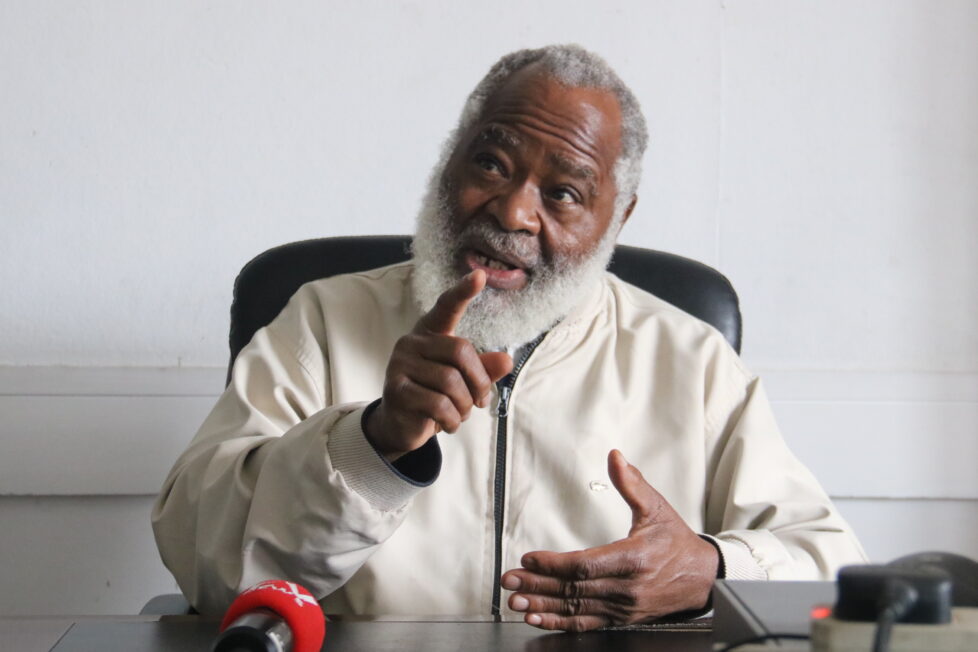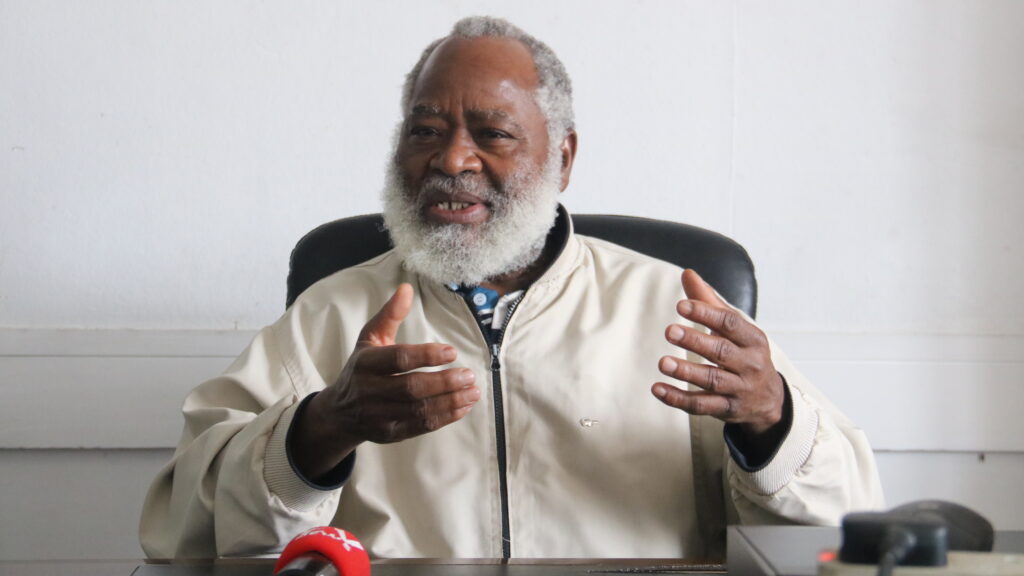Prof. Kithaka wa Mberia: I write for the heart and soul our society
“When I write, I write what is in my heart. Because I live in this country. The things that I see happening and those issues that affect me like a Kenyan and an African.”

“When I write, I write what is in my heart. Because I live in this country. The things that I see happening and those issues that affect me like a Kenyan and an African.”

Professor Kithaka wa Mberia is reluctant. His office at the University of Nairobi’s Department of Linguistics and African Languages doesn’t look classic despite his forty years’ occupancy where classic works of literature speaking to the heart, soul and consciousness of today’s society are churned.
The ubiquitous shelf that stands aloof carries newly published titles and old research works that tells the story of a scholar whose life captures the imagination of a nation’s socio-political fabric.
When Sisi Afrika sat down with Prof. Kithaka for an interview, he made it known that he had several titles under his name apart from Kifo Kisimani, as he spoke passionately why his writing evokes national consciousness.
He believe writers differ in many aspects. He thinks are those who write what they perceive their audience want to listen to so that they could benefit from it financially or in other ways. There are also writers,according to him, who are like artistes who compose music, and when they do so, they bring out what’s in their hearts as they don’t do it to make people happy or to please those in power.
“When I write, I write what is in my heart. Because I live in this country. The things that I see happening and those issues that affect me like a Kenyan and an African” Prof. Kithaka began.
With a bubbling energy engrossed in undying passion evident in his facial expression, he narrated what drives him to write. He noted that sometimes one can see and interpret the happenings in the society because they know if for instance if something happens, then there will be likely consequence to follow, and in politics, it is not difficult to interpret the consequences of actions committed by leaders and everyone.
“I want to tell you that many happenings that have occurred in Africa like coupes in several countries or civil wars have been captured in my books, if you read my book Mchezo wa Karata, you’ll be surprised. If you look at the happenings in the Democratic Republic of Congo and read Msimu wa Tisa, then you’ll be surprised how did I come to know about these before they happened,” said Prof. Kithaka.

He nonchalantly remembered how he gifted a Cameroonian friend with one of his books, translated into English, and the friend was astonished that what’s in the book is similar to happenings in his own country. He credits this into delving deeply not only in the issues that happen in Kenya, but other countries in the continent.
“Even Kifo Kisimani, someone told me that it cannot be accepted as a set book in secondary schools in some of the countries in east Africa because they will see Bokono, one of the central characters in the book as a leader in their own country, and they will as well view Mwelusi as one of their own,” he noted.
He believes the ruling class may feel unease with his works because they point out the ills bedevilling the society. “I know politicians will have the book banned from getting studied because they think it will incite the masses. This is because I write from my heart. I don’t write to entertain politicians because I do it for prosperity and generations coming after myself.”
Prof. Kithaka thinks critically first before writing. He says if you study his work, he does not write to target anyone specifically, and that he can’t write poems or plays targeting an individual since that amounts to abuse of art and creativity.
As an astute linguist, he employs various stylistic devices that wows readers and he explains the reason. Humour is his favourite. “If it’s not for church and other religious places, in other fields, people hate boredom. In literature if you have a critical message to pass across, using humour is sometimes the best way to pass such messages.”
He is proud of his work and promises more. He notes, “If my works were making young people to commit social ills then I would highly regret my actions, but if they get informed because my work has opened their eyes about certain things then I shall have contributed positively to the society.”
He encourages the use of Kiswahili language. In his explanation, there are 7,400 languages. In all those, 2,500 languages are spoken in Africa, and in all those spoken in Africa, Kiswahili is the most widely spoken compared to other languages in the continent.
“Kiswahili is the seventh or eighth biggest spoken language in the whole world. Because it is spoken by 200 million people. That huge number speaking it makes it a very important language. Despite being Kenya’s foremost language of communication, we should underrate it because its spoken too in other continents, I have taught English in South Korean university for two years. I have as well taught Kiswahili in Poland and in America,” said Prof. Kithaka.

His book Natala (1997) which became a set book is about gender issues. Kifo Kisimani (2001) which was also a set book for seven years, deals with dictatorship. Flowers in the Morning Sun (2011) is about political clashes and also tackles the land question which is a big issue in this country.
His poetry anthologies include Mchezo wa Karata (1997), Bara Jingine (2002), Redio na Mwezi (2005), Msimu wa Tisa (2007) and Rangi ya Anga (2014).
Books translated into English are Death at the Well (2011), Natala (2013), Flowers in the Morning Sun (2011), A game of Cards (2011) and Another Continent (2011).
Prof Kithaka was born on 8 August 1955. He is married with two children. For his education, he went to Chuka High School (O’ –Levels), Alliance High School (A’ –Levels), B.A. (Hons.), (University of Nairobi, 1979), M.A., (University of Nairobi, 1981) and PhD (University of Nairobi 1993).
He is currently the Associate Professor, Department of Linguistics and African Languages, University of Nairobi. He is a recipient of the Fulbright Scholar-in-Residence, Virginia State University, 2005/2006.
